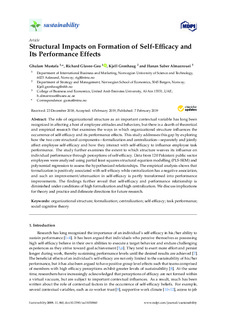Structural Impacts on Formation of Self-Efficacy and Its Performance Effects
| dc.contributor.author | Mustafa, Ghulam | |
| dc.contributor.author | Almazrouei, Hanan Saber | |
| dc.contributor.author | Grønhaug, Kjell | |
| dc.contributor.author | Almazrouei, Hanan Saber | |
| dc.date.accessioned | 2019-06-07T06:56:16Z | |
| dc.date.available | 2019-06-07T06:56:16Z | |
| dc.date.created | 2019-02-07T15:32:13Z | |
| dc.date.issued | 2019 | |
| dc.identifier.issn | 2071-1050 | |
| dc.identifier.uri | http://hdl.handle.net/11250/2600235 | |
| dc.description.abstract | The role of organizational structure as an important contextual variable has long been recognized in affecting a host of employee attitudes and behaviors, but there is a dearth of theoretical and empirical research that examines the ways in which organizational structure influences the occurrence of self-efficacy and its performance effects. This study addresses this gap by exploring how the two core structural components—formalization and centralization—separately and jointly affect employee self-efficacy and how they interact with self-efficacy to influence employee task performance. The study further examines the extent to which structure weaves its influence on individual performance through perceptions of self-efficacy. Data from 120 Pakistani public sector employees were analyzed using partial least squares structural equation modelling (PLS-SEM) and polynomial regression to assess the hypothesized relationships. The empirical analysis shows that formalization is positively associated with self-efficacy while centralization has a negative association, and such an improvement/attenuation in self-efficacy is partly transformed into performance improvements. The findings further reveal that self-efficacy and performance relationship is diminished under conditions of high formalization and high centralization. We discuss implications for theory and practice and delineate directions for future research | nb_NO |
| dc.language.iso | eng | nb_NO |
| dc.rights | Navngivelse 4.0 Internasjonal | * |
| dc.rights.uri | http://creativecommons.org/licenses/by/4.0/deed.no | * |
| dc.subject | organizational structure | nb_NO |
| dc.subject | formalization | nb_NO |
| dc.subject | centralization | nb_NO |
| dc.subject | self-efficacy | nb_NO |
| dc.subject | task performance | nb_NO |
| dc.subject | social cognitive theory | nb_NO |
| dc.title | Structural Impacts on Formation of Self-Efficacy and Its Performance Effects | nb_NO |
| dc.type | Journal article | nb_NO |
| dc.type | Peer reviewed | nb_NO |
| dc.description.version | publishedVersion | nb_NO |
| dc.source.volume | 11 | nb_NO |
| dc.source.journal | Sustainability | nb_NO |
| dc.identifier.doi | 10.3390/su11030860 | |
| dc.identifier.cristin | 1674615 | |
| cristin.unitcode | 191,0,0,0 | |
| cristin.unitname | Norges Handelshøyskole | |
| cristin.ispublished | true | |
| cristin.fulltext | original | |
| cristin.qualitycode | 1 |
Tilhørende fil(er)
Denne innførselen finnes i følgende samling(er)
-
Articles (SOL) [143]
-
Publikasjoner fra CRIStin (NHH) [249]

